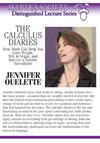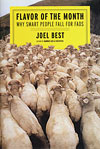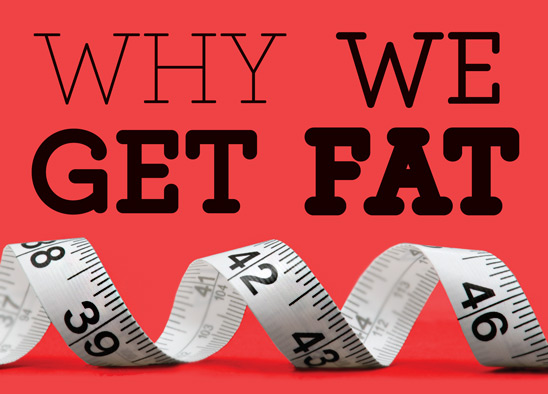There is little doubt that the United States, along with much of the rest of the world, is in the midst of an epidemic of obesity. As we get fatter, the diseases associated with obesity — diabetes, cardiovascular diseases, cancer — continue to rise. Despite the fact that we are constantly exhorted to eat less and exercise more, we continue to get fatter. A neutral observer might conclude that there is something wrong with the science here. Gary Taubes claims to be one such observer, and he’s convinced that there is definitely something wrong with the science of nutrition as it is being practiced today.
The central thesis of Taubes’ new book, Why We Get Fat is that carbohydrates in our diet is the cause of this epidemic. While his thesis is unquestionably controversial, Taubes builds a strong scientific case that this is indeed what is happening. If he is right — and his work has the ring of scientific truth about it — it means that much of the dietary advice we have been following is flat-out wrong.
This book reviews much of the same ground that his previous work, Good Calories, Bad Calories covered. That work was nearly five hundred pages of densely-written, heavily annotated scientific prose. Unsurprisingly, many readers found it to be hard going as it was aimed at a scientifically-oriented audience. One of Taubes’ aims in Why We Get Fat is to cover the same ground but, as he says in the introduction, in a form that husbands, wives, parents, or friends and siblings can read without difficulty.
Gary Taubes is no neophyte in writing about scientific controversies. Before he turned his attention to dietary science, Taubes wrote about physics, such as the highly acclaimed Bad Science: The Short Life and Weird Times of Cold Fusion, about Pons, Fleischman, and the problems that ensue from announcing a major scientific discovery by press conference before anyone has a chance to replicate your findings; and also Nobel Dreams, a critical look at Carlo Rubbia and the harm to science in general and to a scientific career in particular that can result from the pursuit of the Nobel Prize. For such work Taubes won the Science in Society Award of the National Association of Science Writers three times. He is currently a Robert Wood Johnson Foundation Investigator in Health Policy Research at the University of California, Berkeley School of Public Health. So Taubes’ bona fides as a researcher and writer are impeccable. But is his science?
Why We Get Fat is divided into two major sections. The first, Biology, not Physics, is generally a debunking section that endeavors to break down much of what we think we know about getting fat. Among other themes, it explains why the calories-in/calories-out hypothesis is false. The second section, Adiposity 101, clarifies the science behind fat accumulation, and comes up with some startling, but well-supported conclusions as to why we’re really getting fat.
Book I covers a theme that should be familiar to skeptics: that should draw our conclusions from the evidence, wherever the evidence might lead — in this case, why we get fat. If the evidence contradicts our beliefs, do we ignore the evidence, or do we change our beliefs? Taubes wants us to change our beliefs.
The conventional wisdom describing the obesity epidemic is that we eat too much and don’t exercise enough. We live in a “toxic environment” where food is too readily available and where we don’t move around enough to burn off what we eat. Too much food too easily available, sedentary lifestyles — that’s what’s making us fat.
Not quite, says Taubes, beginning with the fact that obesity correlates more closely with poverty than prosperity. He gives examples of several obese populations that had no access to any of the factors that we assume are making us fat today. For example, the Native American tribe known as the Pimas were remarked upon by mid-19th century explorers as being lean and in fine health. By 1900, however, the Pima had been consigned to reservations, living on government rations that consisted largely of white flour and sugar. And, according to the anthropologists who documented their fate, they were fat.
The Pima are just one example of several populations that Taubes references who became fat despite (or because of?) poverty, and despite the absence of the several factors we assume are making us fat today.
Next, Taubes goes into the “Elusive Benefits of Undereating,” and “The Elusive Benefits of Exercise.” Eating less may work in theory, but as Taubes shows, many medical studies show that it doesn’t work in practice. Calorie starved patients didn’t lose much weight, and those who did regained it shortly thereafter. Is this due to the moral weakness of the patients, or is there a biological reason?
Likewise exercise: Taubes acknowledges that exercising may well be good for us, but that it is, generally speaking, not an effective method for losing weight or keeping it off. In an amusing example, he asks: if you knew you were going to a huge feast in the evening, what would you do to ensure you had a good appetite? You’d follow the exact advice we are given to lose weight: eat less and exercise more. So, the method you would use to make yourself as hungry as possible for the evening is the same as the advice for losing weight!
For some, exercise is something we do in a gym, or on a track, or at a sporting venue. While many of us work in sedentary occupations, domestics, gardeners, construction workers and other physical laborers get plenty of exercise as a normal part of their jobs. Taubes points out that, 1) many of the jobs involving physical activity are done by the poor and disadvantaged and, 2) many of these people are still fat. So, if physical activity is the key to staying lean, why do the poor tend to be more obese? This is another argument against the calories-in/calories-out hypothesis.
One other example: A 2006 study of 13,000 habitual runners, all subscribers to Runner’s World magazine, found that, indeed, those who ran the most tended to weigh the least, but that all the runners tended to get fatter with each passing year. The implication is that in order to keep weight constant it is necessary to increase running mileage year after year, as the runner gets progressively older. As Taubes notes, maybe it’s time to question these underlying beliefs.
There is a fairly widespread belief that the calories-in/calories-out hypothesis is supported by the first law of thermodynamics. The first law, also known as the law of energy conservation, roughly states that energy cannot be created nor destroyed, but only changed from one form to another. In a section entitled Thermodynamics for Dummies, Taubes neatly explains why this law does not explain weight gain and loss any more than Newton’s laws of motion or Einstein’s laws of relativity would. While it is true that in order to gain weight we must eat more calories than we expend, the first law explains nothing about causality: it does not explain why we overeat. This is the real question that must be answered in order to deal with the obesity epidemic, and it is dealt with in Book II.
Finishing up Book I, Taubes attempts to take some of the blame away from the obese themselves. This may not be a popular viewpoint, but if the cause of obesity is biological (genes and physiology) and not moral (gluttony and sloth), then we have been barking up the wrong tree when looking for causes and cures. Why, he asks, would someone voluntarily subject themselves to the opprobrium, and the debilitating effects, of obesity?
Having dispensed with many weighty misconceptions, in Book II Taubes goes into what he argues is the real science of fat. He discusses the role of insulin and insulin resistance in fat regulation, why some people get fat and not others, and individual variations in the way fat is regulated. Little of the science Taubes discusses here is controversial: The operation of insulin, for example, has been established for decades. What Taubes does, however, is to gather and synthesize the known science into a coherent whole. This does not mean his conclusions are not controversial, just that the science itself isn’t.
For example, in a chapter entitled A Primer on the Regulation of Fat, Taubes reviews the details of the science behind fat metabolism, explaining the processes by which fat is regulated, stored, and released. Basically, when insulin increases fat is stored; when insulin decreases, fat is released. If we keep our insulin levels low, fat will be burned. There is more to it than this, which Taubes explains clearly, but that is the basic idea. There might be a lot less confusion about weight loss and gain, Taubes insists, if facts like these were more widely understood.
Taubes discusses what we can do about the dietary fix we’ve eaten ourselves into. If you haven’t guessed yet, he considers the culprits to be carbohydrates in all their forms: “In a world without carbohydrate-rich diets, obesity would be a rare condition.”
We all know people who can eat as much as they like yet remain slender. Subsequent chapters explain why some of us get fat and others stay lean eating approximately the same amount of food. There is seemingly no justice here! Also covered is why many of us get heavier as we age. Hint: Taubes reckons it has to do with insulin resistance.
Taubes considers fructose to be a serious contributor to being overweight. He quotes biochemists who called it the most “lipogenic” of carbohydrates, the one converted most easily to fat. Many of us are aware of, and try to avoid, the high-fructose corn syrup in sodas and other products. But what about the fructose in fruits? The fruits we eat have undergone hundreds of years of selective breeding to increase their size and sweetness. Many contain substantial amounts of fructose, so Taubes suggests that maybe we should track the amount of sugar we get when we consume fruit, as well as our sodas.
There is a lot more controversy in the remainder of the book. Without reviewing all the details here, Taubes shows how many human cultures in the past obtained most of their calories from animal foods without suffering from heart disease or any of the other diseases that plague Western civilization.
Some other subjects covered that are likely to induce cognitive dissonance in readers accustomed to the party line on obesity:
- Saturated fat is either harmless or beneficial, and is not responsible for heart disease.
- Eating fat is not the cause of getting fat.
- Why there is little genuine scientific support for the benefits of a low-fat diet.
- A low carbohydrate diet is the best diet for humans.
To be sure, much of what Taubes says is going to be a hard sell. It is diametrically opposed to the dietary advice outlined by such organizations as the American Heart Association. Nevertheless, throughout the book Taubes clearly supports his positions in a way that leaves little room for argument (which is not to say there won’t be any).
Diet and nutrition is not a field that has received much scrutiny by the skeptical community, but Why We Get Fat fits squarely within the canon of skeptical analysis. We skeptics like to believe that we reach our conclusions based on reason and evidence, and we are supposed to be willing to change our opinions in the face of new evidence. Well, here it is: a book that turns upside-down almost everything we think we know about human nutrition.
If Taubes is wrong, well, his error is a doozy! Following his advice will lead to increases in obesity, cancer, heart disease, diabetes and all the other conditions Western civilization is heir to. Ironically, this is exactly what we are already experiencing. If bad science leads to bad results, then maybe it’s time for a paradigm shift. That is certainly what Taubes believes. ![]()
Skeptical perspectives…
-
 The Calculus Diaries: How Math Can Help You Lose Weight, Win in Vegas & Survive a Zombie Apocalypse
The Calculus Diaries: How Math Can Help You Lose Weight, Win in Vegas & Survive a Zombie Apocalypse
by Jennifer Outlette (CD $15.95 DVD $23.95)
-
 Flavor of the Month: Why Smart People Fall for Fads
Flavor of the Month: Why Smart People Fall for Fads
by Joel Best (hardback $19.95)
This article was published on January 5, 2011.















